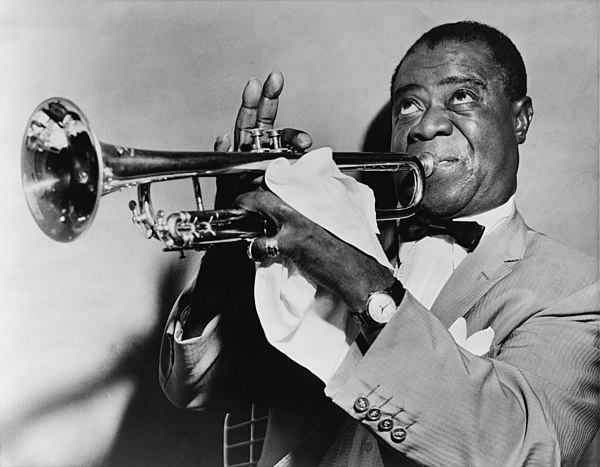
Name: Louis Armstrong
Gender: Male
Occupation: Musician
Please feel free to read what others say about this name and to share your comments if you have more information.
For privacy reasons, we cannot provide the meaning of this celebrity's name! Instead, please find the Numerology Interpretation for that name.
Numerology of the first name Louis: calculate the core numbers of your numerology chart to discover your numerological profile and your personality traits.
The Growth number corresponding to this first name is 22. It denotes a pattern that assists you in growth and development: visionary, successful, leader, innovative, genius.
Interpretation:
Qualities: Successful, Visionary
Ruling planet: Uranus
Colors: Blue, Gray
Gemstones: Sapphire
Learn more with our free Numerology Tool
Which stars are celebrating their birthday today?
Check our Celebrities Birthday Calendar and find out celebrities born on your birthday.
Biography
Louis Armstrong (August 4, 1901 – July 6, 1971), nicknamed Satchmo or Pops, was an American jazz trumpeter, singer, and an influential figure in jazz music.
Coming to prominence in the 1920s as an "inventive" trumpet and cornet player, Armstrong was a foundational influence in jazz, shifting the focus of the music from collective improvisation to solo performance. With his instantly recognizable gravelly voice, Armstrong was also an influential singer, demonstrating great dexterity as an improviser, bending the lyrics and melody of a song for expressive purposes. He was also skilled at scat singing (vocalizing using sounds and syllables instead of actual lyrics).
Renowned for his charismatic stage presence and voice almost as much as for his trumpet-playing, Armstrong's influence extends well beyond jazz music, and by the end of his career in the 1960s, he was widely regarded as a profound influence on popular music in general. Armstrong was one of the first truly popular African-American entertainers to "cross over", whose skin color was secondary to his music in an America that was severely racially divided. He rarely publicly politicized his race, often to the dismay of fellow African-Americans, but took a well-publicized stand for desegregation during the Little Rock Crisis. His artistry and personality allowed him socially acceptable access to the upper echelons of American society that were highly restricted for a black man.
The section "Biography" of this page contains content from the copyrighted Wikipedia article "Louis Armstrong"; that content is used under the GNU Free Documentation License (GFDL). You may redistribute it, verbatim or modified, providing that you comply with the terms of the GFDL.
We always try to deliver a high-quality service to our customers. If you consider the information on this page is incomplete or incorrect, please post a comment below. Thank you!
Comments